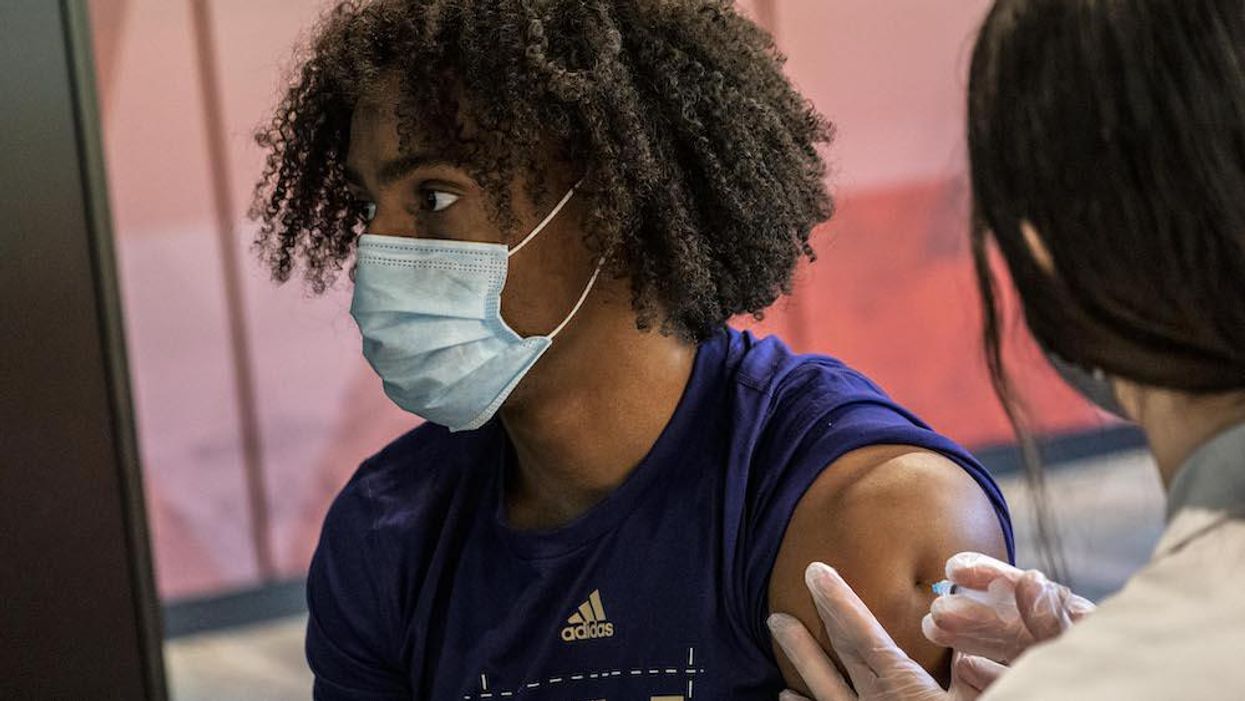
Photo by David Ryder/Getty Images

More than 450 U.S. colleges and universities are mandating that all students be fully vaccinated against COVID-19 before the fall 2021-22 semester. Some are even requiring vaccines for summer classes.
These mandates are not sitting well with many parents, students, and even school faculty.
Two professors from major universities took to the pages of the Wall Street Journal to explain why schools should not treat students like "guinea pigs" and to warn that mandating that students get shots is a violation of medical ethics.
In an op-ed for the Journal, Dr. Aaron Kheriaty, a professor of psychiatry and director of the Medical Ethics Progam at the University of California, Irvine, and Gerard V. Bradley, a law professor at Notre Dame, lamented that so many schools are mandating vaccinations and reminded readers that the move is unprecedented — even within the U.S. military:
Schools have for decades required vaccination against infectious diseases, but these mandates are unprecedented — and unethical. Never before have colleges insisted that students or employees receive an experimental vaccine as a condition of attendance or employment.
Even soldiers, whose rights are constrained when they join the service, aren't being compelled to take a Covid vaccine. In a case involving a vaccine against anthrax, a federal district judge held in 2004 that “the United States cannot demand that members of the armed forces also serve as guinea pigs for experimental drugs" absent informed consent or a presidential waiver of service members' legal protections. The following year the judge held that an emergency-use authorization from the Food and Drug Administration was insufficient to meet the legal test.
Professors Kheriaty and Bradley reminded readers that though the FDA has issued emergency authorizations for the Pfizer, Moderna, and Johnson & Johnson vaccines, none of the three has been actually approved by the agency. And that is a legal and ethical problem for schools that want to force student to get the shots.
Universities might claim that immunizations for other diseases are already required for many students and are for students' own good, the authors said, but COVID is a different story. For people under 30, they said, "the risks of serious morbidity and mortality are close to zero," but the vaccines are not necessarily safe for people under 30:
By contrast, early indications from passive surveillance systems (which call for follow-up investigation) and a June 10 review by the FDA's Vaccines and Related Biological Products Advisory Committee indicated an excess risk for heart inflammation, especially in men 30 and younger.
Kheriaty and Bradley also pointed out that schools are ignoring the massive share of college students who have already recovered from COVID and have natural immunity, "which studies have suggested is more robust and durable than vaccine immunity."
Then there is problem that the schools' vaccine policies would subject "populations that were deliberately excluded from clinical trials" to "experimental risks," including people who have recovered from infection, pregnant women, and breast-feeding women.
Schools, they asserted, are pushing mandates that "violate basic principles of medical ethics":
Even if the vaccines receive full FDA approval, no sensible understanding of herd immunity can justify forcing vaccinations on healthy young adults who are at minimal risk of hospitalization or death from Covid, especially those who already had Covid. We don't immunize children against diseases that primarily harm the elderly in hope of reducing transmission risks for the elderly. That would use the recipients as a means to another end, which is unethical.
Consider the analogy of nontherapeutic research, from which the research subject doesn't stand to benefit directly. The central canon of medical ethics in this situation is the free and informed consent of the research subject, as articulated in the Nuremberg Code and the Helsinki Declaration. Informed consent is likewise required for medical decisions in all adults of sound mind. This is arguably the most deeply rooted doctrine in contemporary medical ethics.
A person may freely choose to accept medical risks for the benefit of others, as when one donates a kidney for transplant. But there is no moral duty to do so. This is why we don't harvest organs without consent, even if doing so would save many lives. Those who make such sacrifices for others must truly be volunteers, not conscripts drafted by college administrators.
The heads of the universities need to stop with their "specious" arguments that the mandates will help students "feel safe" enough to come back to school, the professors wrote. Forcing those with natural immunity to get shots "doesn't make anyone actually safer," they said, adding that it's "wrong to risk harming healthy people so that college can peddle a psychological placebo."
Now is the time to maintain "integrity under pressure," they concluded, and not "abandon ethical principles" in the face of "dire situations."
None of the schools' arguments, they added, "justifies coercive policies that steamroll fundamental liberties."